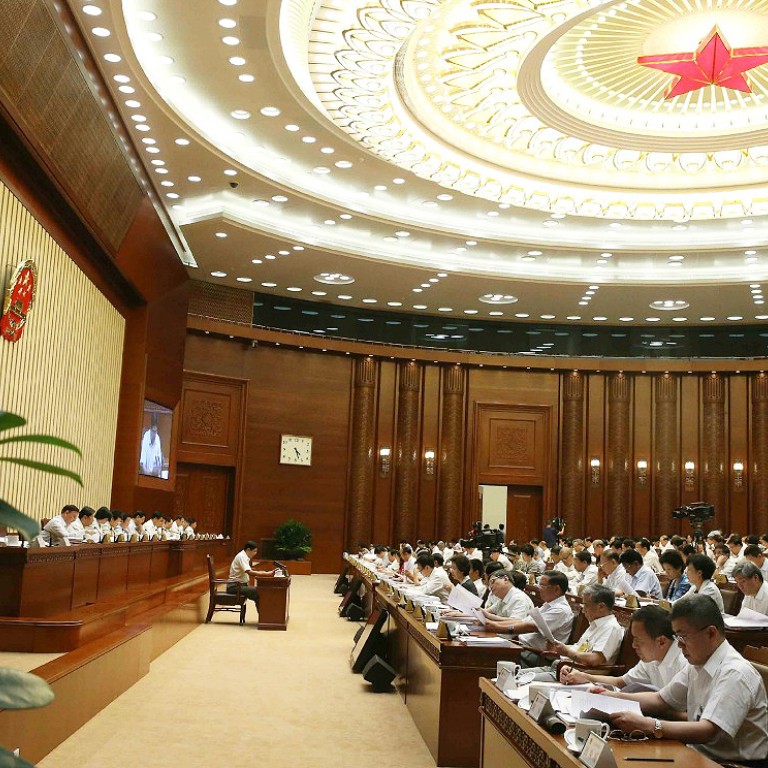
New | Universal suffrage for 2017 election should be approved in Beijing ‘on Wednesday’
Members of top legislative body praise Leung Chun-ying's report on political reform, as the chief executive and Occupy Central's Benny Tai clash in Hong Kong
Beijing’s top legislative body should give preliminarily approval on Wednesday for Hong Kong to elect its next leader by “one man, one vote”, according to local deputies to the National People’s Congress speaking in Beijing today.
NPC deputy Ip Kwok-him also said the details of political reform – including highly contested issues such as the nomination threshold for candidates – will be discussed at tomorrow’s meeting, after which a report will be drawn up by senior figures.
In Hong Kong, Chief Executive Leung Chun-ying said that reform does not have to meet any international standards according to the Basic Law.
Leung pointed out that many aspects of the mainland-Hong Kong relationship – such as the currency peg to the US dollar – are unique to the territory.
But legal academic and Occupy Central co-founder Benny Tai Yiu-ting later argued that Leung had misunderstood.
Article 39 of the Basic Law says that the International Covenant on Civil and Political Rights remains in force in Hong Kong after the handover, Tai said.
“[The covenant] says every citizen must have equal voting rights,” he added.
Leung had said that granting foreign permanent residents the right to vote, as Hong Kong does, was also not the international norm.
“If the [chief executive] election in 2017 must fulfil international standards, should we deprive foreigners who are among the 5 million qualified voters of the right to universal suffrage?” he said.
In a large number of developed nations, permanent residents who are not citizens have limited voting rights, but once someone becomes a citizen they would have full voting rights in most countries.
Leung attempted to offer further examples to support his argument.
“The Basic Law requirement that the person elected as chief executive must then be appointed by the central government – this does not fit international standards.
“Hong Kong enjoys financial independence and need not contribute to the central government’s treasury. This is the privilege granted by the central government to Hong Kong... This does not fit international standards either,” he said.
Leung also referred to the fact that Hong Kong and the mainland use different currencies.
The pro-democracy camp have argued that the model for the 2017 election must meet international standards for universal suffrage, meaning no unreasonable restriction could be placed on running or voting in the election.
The model should also provide voters with a genuine choice between candidates. Occupy plan to stage a mass sit-in if the official plan for the election does not offer genuine choice.
Leung said Occupy would be “counterproductive” to achieving universal suffrage.
In Beijing, NPC deputy Maria Tam Wai-chu said members of the NPC Standing Committee had agreed with the report on political reform that the chief executive had delivered last month.
The report was intended to summarise opinion in Hong Kong about reform, but Leung was accused of downplaying or ignoring non-establishment views. “The NPCSC members who spoke in the morning agreed … that he had explained Hong Kong’s situation comprehensively,” Tam said.
Ip and Tam were speaking after sitting in on the Standing Committee’s first group discussions this morning. The committee is expected to lay out a framework for reform by the end of its meetings on Sunday.
“I think it’s likely that a report will be made in the plenary session tomorrow on the detailed content of the resolution,” Ip said – referring to a “draft decision” to be prepared by the NPC Chairmen’s Council, which consists of the chairman Zhang Dejiang and the 12 vice-chairmen.
About 1,000 people have been invited to attend a briefing to be held at the AsiaWorld-Expo in Lantau next Monday where the Standing Committee’s decisions will be explained.
Those invited include legislators, chairmen and vice-chairmen of District Councils and the city’s deputies to the NPC and the Chinese People’s Political Consultative Conference.
It is understood that the Beijing officials will meet senior government officials and executive councillors in a separate briefing at the government headquarters in Tamar that afternoon.


